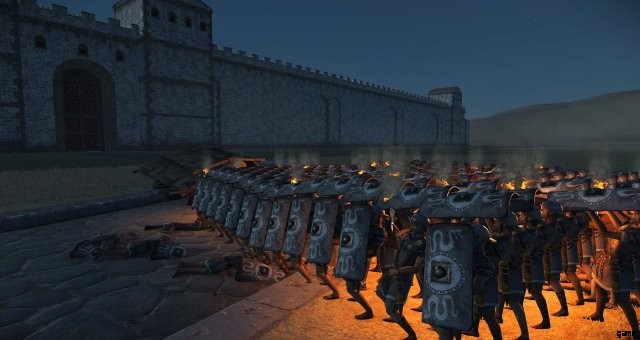Total War:Rome Remastered – 公共秩序の維持:居住地を占領、奴隷化、または根絶するタイミング

この簡潔かつ完全なガイドは、公共の秩序を維持するという障害を乗り越えるのに役立ちます。書面での私の目的は、公共秩序がどのように機能するか、何がそれを低下させ、それを改善するために何ができるかをお知らせすることです.入植地を占領、奴隷化、または根絶する時期、キャンペーンの方向性に影響を与え、公序良俗に影響を与える決定を支援するつもりです.
公共の秩序を維持するためのガイド
征服方法
占領中
- 職業により、ユニットの募集を即座に増やします。
ローマの総力戦では、各入植地に人口メカニズムがあります。部隊を募集すると、その部隊に必要な人数が、選択した入植地の人口プールから削除されます。占拠は、その居住地の人口に与える害が最も少なく、迅速かつ持続的な募集という点で最大限の利用を提供します。これは、フロンティアの居住地が小さすぎて根絶された場合に募集を行うことができない初期の段階で役立ちます。
- 理論的には職業は税金に最適です。
人口プールが大きいと、そこからより多くの税金を引き出すことができます。占領された集落の潜在的な収入は最大になります。しかし、課税は公序良俗に反するものです。内乱に苦しむ大規模な集落を占領しても、その大規模な人口プールを課税に利用することはできません。公序良俗のバランスをとるために税金を引き下げる必要があります。それにもかかわらず、占領者の文化を共有する入植地の場合のように、増税を視野に入れた占領は実行可能です。
- 職業は居住地のアップグレードへの近道です。
居住地は、人口の上限に達するとアップグレードのロックを解除します。これらのアップグレードにより、より優れた軍事、市民、および経済の建物の建設が可能になります。上記は、戦争を遂行する能力を増幅し、公共の秩序に貢献し、収入を増やします。居住地のアップグレードは、間違いなく世界支配にとって最も重要な要素です。彼らは、ますます専門化された軍隊の名簿を提供し、募集する.また、さまざまな軍事的、経済的、および管理上のバフも与えます。彼らはあなたの最大の資産であるため、できるだけ早くアップグレードのロックを解除したいと考えています。占領することで、その目的のために居住地の人口プールを維持できます。
- 職業は公序良俗に反し、短期的な金銭的利益を妨げます。
実際には、公の秩序に問題を提示することなく、人口プール全体を利用するために居住地を占領できることはめったにありません。私のゲームでの占領の最大の障害は、即時のインセンティブの欠如です。人口を奴隷化または根絶することは、そのターンの資金を提供し、マップに圧力をかけ、増加することにより、戦争を遂行するための即時の能力を強化するのに有利であるためです。治安を管理可能なレベルにまで引き上げることで、防御に移行する代わりに、次の征服に注意を集中できるようになり、拡張を停止して最新の入植地の統合に集中することができます。
奴隷化
- 奴隷化は、入植地のアップグレードを世界的に急ぐための唯一の最良の方法です。
奴隷化機能は、和解の人口の一部を取得し、それらを既存の町や都市に分割します。この方法は、派閥全体の入植地の成長への最速の近道です。ただし、この戦略を利用しても、客観的にポップ数が増えるわけではありません。新しい居住地の短期的な成長を犠牲にして既存の居住地を構築し、開始する居住地を最終的な都市化に一歩ずつ近づけます。これは記録的な速さでマリアンの改革に到達するための実行可能な戦略です。
- 奴隷化は募集に適度に適しています。
小さな集落でユニットを募集する能力を維持しながら、治安のバランスを取りたいプレイヤーのための中間地点.
- 奴隷制は徴税に有利です。
In theory not as good as occupying, but enslavement is the pragmatic choice for collecting taxes efficiently, balancing public order without sacrificing your population. This is the best way to maximize income, as it allows you to increase taxes all the while not outright losing any pops. The enslaved pops go someplace else where they continue to contribute to the income of your faction globally.
- Enslavement gives you a bit of income.
The seizure of the slaves’ property by the state lands you some immediately usable funds. The amount seized and number of slaves taken depends on the size of the settlement.
- Enslavement balances public order without hindering population growth significantly.
It’s often enough to enslave a population to bring public order to a manageable level. Thus it should be preferred when population growth is desirable, as it’s much less disturbing than eradicating the population.
Exterminating
- Extermination is the most meaningful and impactful strategic decision in the game.
The income seized depends on the size of the settlement and represents the largest instantly felt financial boost in the game. The alternative is investing in the tax revenue afforded by the existing, large population pool. The long term negative consequences of an underdeveloped settlement is exceeded by the value in instantly fueling your capacity to construct buildings, recruit armies, and hire mercenaries. The impact to population growth can also be partially mitigated over time by constructing growth boosting buildings. The potential in exterminating a large settlement, especially early in the campaign should not be understated. It’s a huge incentive for more experienced players, looking to sacrifice local development for opening up strategic options previously unavailable.
- Extermination instantly solves public order difficulties in almost every case.
It’s a one button solution for players who find public order management to be distracting. Even severe public order debuffs will likely not be an issue for a while after an extermination. Population is intricately tied to squalor and other issues which are solved with the reduction in population. A settlement that has reached it’s population ceiling and hasn’t received an upgrade will begin to deteriorate in public order. Extermination is the answer to quelling unrest in settlements you don’t intend to manage.
- Extermination… annihilates the population of the settlement.
The practice of cutting down the population impedes recruitment in small settlements early in the game, delays settlement upgrades, and reduces the income of the settlement drastically.
Factors affecting public order
Distance from capital
An element that kicks in once your faction has grown larger. It’s generally a good practice to reorient your capital to be in the center of your faction. Sometimes, however, there is a particular problem region with a lot of foreign culture. In cases where public order is unmanageable somewhere in particular it’s preferable to shift your capital there until that region has been fully integrated.
Squalor
A problem felt in settlements without health boosting buildings, or where the population has exceeded the size of the settlement. Build health boosting buildings such as baths and sewers, and upgrade the settlement to decrease squalor.
Taxation
Increasing taxes reduces public order and population growth, and conversely lowering taxes increases public order and population growth.
Presence of foreign culture
The game has a number of cultures in it. Some can coexist with no issue, as with Greeks and Romans. Other cultures are incompatible and integration will require the dismantling or converting of foreign buildings, causing the population to switch culture to one’s own.
Corruption
Corruption will slowly creep in and become a bigger problem as the game goes on. You deal with it by constructing buildings with an effect on law, centralizing your capital, and stationing governors with positive traits.
